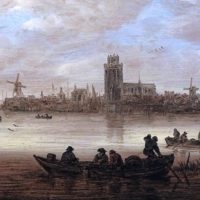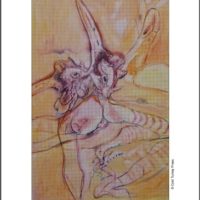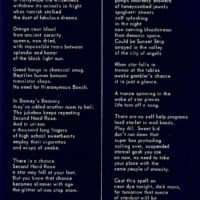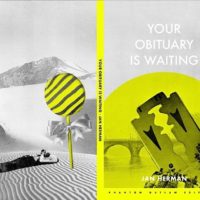“And I told you: no works of art, no language, no words, no thought, nothing. Nothing except a sort of incomprehensible and totally erect stance in the midst of everything in the mind. And don’t expect me to tell you what all this is called, and how many parts it can be divided into; don’t expect me to tell you its weight; or to get back in step and start discussing all this so that I may, without even realizing it, start THINKING.”
What . ? . No Patti Smith?
Just kidding . . .
Last Breath, Memorialized
Cold Turkey Press has printed a card of this photo and poem in a limited edition.
Last Breath
There are things / closer than rain / that keep hope alive— /
tenement flowers / seasoned with heartbreak, / chattering weeds / and the silence of fireflies— / things that may not be / more brilliant / than a wine-stained shirt / and crow’s-feet eyes. / But they will do …
‘I Do Not Think. I Am Thought. I Am Thought in Action.’
I am that I am that I happen. /
I am a resultant. /
—a coincidence of fields. /
Am is my here. /
That is I there. /
What am I here for? . . . /
I am here to go. /
When the magnetic fields shift / There / is no here. / I am gone.
A Poem and Its Genesis: Malcolm Ritchie’s ‘Writing It’
… and my hand held up against the sky / as if a naked bird singing in sign language / to an empty page lying somewhere / in an uninhabited house where / only dust is moving / from room to room … — from “Writing It”
And From the Outlaw End of the Writing Spectrum
“At age 84, Plymell continues to write, publish and perform—“doing nuttin”, as he says—from his home in Cherry Valley, New York. His activities keep Plymell in steady correspondence with a crowd of like-minded hellions, including rockabilly’s Bloodshot Bill, Sonic Youth founders Kim Gordon and Thurston Moore, bassist Mike Watt, filmmaker Mark Hanlon, guitarist Bill Nace, photographer Philip Scalia and musicologist Byron Coley. Plymell and his wife, Pam, first happened upon Cherry Valley in late 1969 in coming to visit Allen Ginsberg and Peter Orlovsky at their East Hill farm. Moving there for good in early 1970, the Plymells have set into adding to their immense creative legacy.” – Benito Vila
Poetry in Prose: Cheever’s Domestic Confessions
‘I make no headway, and yet it seems best to come here every day and try. It is not easy. I have had winters before and will have them again, and do not seriously doubt that they will end—the winters—but it is not easy. I am reminded of the weeks and months in Rome when I saw nothing with the right eyes but a cobweb gleaming in the sunlight and an owl flying out of a ruin.’ — John Cheever, from his journals
A Blogpost for the Ages
This was it, Jan. 12, 2017 . . . It began like this: ‘On the day Twitter Fingers is sworn in as the preening el presidente of a tin-pot United States of Trumpistan, enabling him to run the country like a division of his family-held company . . . ‘ and continued with a 17-minute recording of Heathcote Williams reading his poem “The United States of Porn.” That reading alone puts the blogpost in a class of its own.
Before the Day Is Over . . .
… and the occasion becomes a nothing burger, here are a few greetings for the New Year … from Jürgen Schneider, Frank Diersch, Gerard Bellaart, and Charles Plymell.
Wishing You a Happy New Year for 2020
me?
i am trying to spend
a quiet holiday
at home,
glad for the chance
to read, write, play
a bit of pyannah,
and generally
enjoy not being dead.
yet.
Malcolm Ritchie: ‘The Wake’
“… we killed a few bottles / and drank to the dead …” — Malcolm Ritchie
‘When Tarnish Stalked the Dust of Fabulous Dreams’
Charles Plymell’s poems are hard-core gems dug out of the earth. Yet they seem effortless to me. Without the slightest hint of literary elbow grease, they shine like polished jewels. I should have published more of them back in the day, but at least there was this one. It’s as gorgeous now as it was then.
Fluxus Impresario Readied for His Closeup
A feature documentary about the impresario of the international avant-garde art movement Fluxus from 1962 to 1978. Interviews with artists include Yoko Ono, Jonas Mekas, and Nam June Paik. Dedicated to cooperative methods and expanded processes, Fluxus could be everything and almost anything: kits, shops, festivals, islands, weddings, food, or Flux Lofts—a network of artist-owned lofts in SoHo, New York. The iconoclastic George Maciunas and the spirit of Fluxus provoke questions still critical to many working artists . . . and a helluva lot of silly serious fun.
When You Get to Your 85th . . .
“So I sit there with earphones, mind you West End of forgotten City East of what used to be a shade of time. Let’s not get into that again… machine gun fire loud & clear… airplanes moving in low & forgotten now like battles in the Pacific… distant artillery for the Americans don’t forget that buddy… sound of Japanese commandos… & Germany end of July 45, 17 sec. past the deadline… sunny morning in Hiroshima, stones trees houses people dust… it’s the 15th with transcribed music… cracks in the record, the unconditional surrender of Hollywood to TV…” — Jürgen Ploog
It’s That Time of Year . . .
. . . when it seems that everybody is looking back over their shoulder more with nostalgia than disgust. I am not immune. Scrolling through some old emails, I came across this one called “from NELSON ALGREN’S LETTERS TO RAJAH.” Rajah was Roger Groening, a friend of Nelson’s and later of mine. Roger died in 2015. I think of him often. He and Nelson became friends, initially by mail, when Roger wrote him a fan letter. They remained friends for some 20 years until Nelson’s death, in 1981.
Review: ‘Captivating … Teasing … Spare … Seductive’
“I was struck by poems made of lines that are poems all on their own—even as they unstack into melodic steps from top to bottom . . . Some are as spare as Chinese widsom. In Herman’s poems you know you are certainly ‘somewhere’ but maybe it’s somewhere only in atavistic memory, the realm of dreams. He writes with what Lavinia Greenlaw called ‘unsettled language,’ which brings less obvious aspects of imagination or observation to the fore . . . teasing, holding attention by where they might be heading. A doubtful adventure? A seductive noire? An obscene history lesson? And of course, mortality raises its knowing head more than once.” — Jay Jones

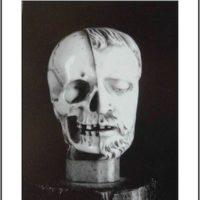
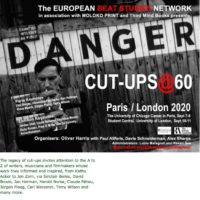


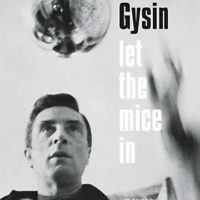
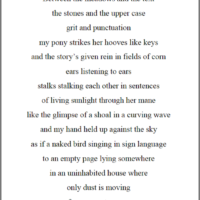
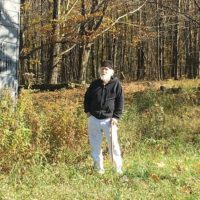
![Heathcote Williams [Photo: JH, 2013]](https://www.artsjournal.com/herman/wp/wp-content/uploads/2017/07/heathcote-williams-photo-copy-200x200.png)
